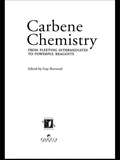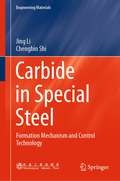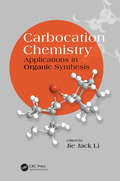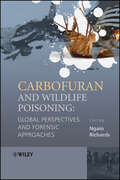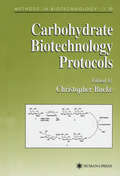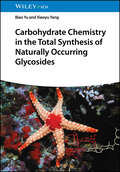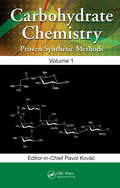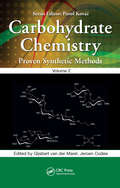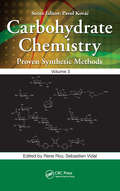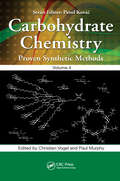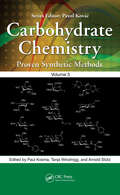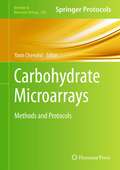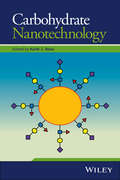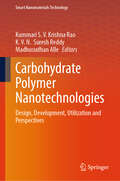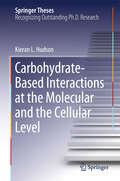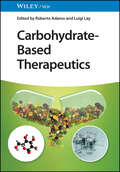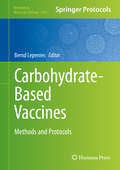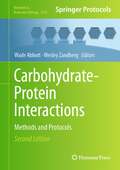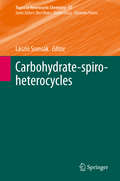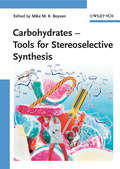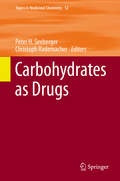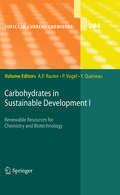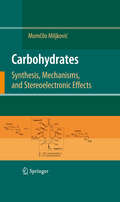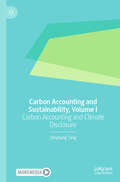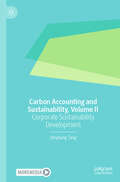- Table View
- List View
Carbene Chemistry: From Fleeting Intermediates to Powerful Reagents
by Guy BertrandHighlights recent discoveries in the development of rapid kinetic techniques that allow for direct visualization and state-of-the-art computational methods.
Carbide in Special Steel: Formation Mechanism and Control Technology (Engineering Materials)
by Jing Li Chengbin ShiThis book summarizes the research results of carbide control in special steel from the authors. It includes the evolution and control of carbide in special steel in the process of electroslag remelting, rolling, and heat treatment, as well as the effect of alloying treatment (rare earth, magnesium, nitrogen, titanium) as heterogeneous nucleating agent on the carbides in special steel. It helps the readers to understand the formation mechanism and control technology of carbide in special steel deeply for improving the quality of special steel further. The book is useful as a reference for researchers, practitioners, teachers, and engineering management team in the fields of metallurgy and materials.
Carbocation Chemistry: Applications in Organic Synthesis (New Directions in Organic & Biological Chemistry #14)
by Jie Jack LiCarbocation chemistry is not only fundamental to the advancement of organic chemistry, it also has found widespread applications in organic synthesis. It is not an exaggeration to say that carbocation chemistry is part of the foundation of organic chemistry. Carbocation Chemistry: Applications in Organic Synthesis provides a panoramic view of carbocation chemistry with an emphasis on synthetic applications. This book is an invaluable tool for organic, medicinal and analytical chemists, including those working in biochemistry as well as the petroleum, plastics and pharmaceutical industries. It is also suitable for upper level undergraduates and graduates in organic chemistry, biochemistry and medicinal chemistry.
Carbofuran and Wildlife Poisoning
by Ngaio RichardsThis cutting-edge title is one of the first devoted entirely to the issue of carbofuran and wildlife mortality. It features a compilation of international contributions from policy-makers, researchers, conservationists and forensic practitioners and provides a summary of the history and mode of action of carbofuran, and its current global use. It covers wildlife mortality stemming from legal and illegal uses to this point, outlines wildlife rehabilitation, forensic and conservation approaches, and discuss global trends in responding to the wildlife mortality.The subject of carbofuran is very timely because of recent parallel discussions to withdraw and reinstate the insecticide in different parts of the world. Incidences of intentional and unintentional wildlife poisonings using carbofuran are undeniably on the rise, especially in Africa and India and gatherings of stakeholders are being organized and convened on a global basis. There is still a need to consolidate information on the different experiences and approaches taken by stakeholders. Carbofuran and Wildlife Poisoning is a comprehensive overview of global wildlife mortality, forensic developments and monitoring techniques and is a definitive reference on the subject.It comprises of historical and current perspectives, contributions from key stakeholders in the issue of global wildlife poisonings with carbofuran, people on the ground who deal with the immediate and long-term ramifications to wildlife, those who have proposed or are working towards mitigative measures and solutions, those in contact with intentional or unintentional 'offenders', those who have adapted and developed forensic methodology and are gathering evidence."Carbofuran and Wildlife Poisoning is a collection of meticulously researched papers from all around the world that provide shocking facts about the effects of a deadly insecticide on wildlife. The book discusses the hundreds of thousands of animals, from elephants to fish, that are poisoned each year, the efforts to rehabilitate those which have been rescued, and the often heroic efforts to ban or reduce the use of the deadly chemical. This book is a must for all those concerned with the problem."--Jane Goodall, PhD, DBE, Founder - the Jane Goodall Institute & UN Messenger of Peace, October 2011
Carbohydrate Biotechnology Protocols (Methods in Biotechnology #10)
by Christopher BuckeA compilation of modern hands-on methods using microbes and enzymes to produce and modify carbohydrates of potential and actual commercial value. These powerful methods enable both the expert and the beginner to generate polysaccharides, oligosaccharides, and carbohydrate-based surfactants by fermentation using enzymes. Additional techniques make it possible to produce derivatives of sugars, other oligosaccharides, and sugar derivatives using enzyme technology. Carbohydrate Biotechnology Protocols offers synthetic chemists, biochemists, fermentation technologists, and applied enzymologists cutting-edge techniques-many of them hitherto unavailable-that are cleaner and often less costly than available chemical alternatives.
Carbohydrate Chemistry in the Total Synthesis of Naturally Occurring Glycosides
by Xiaoyu Yang Biao YuCarbohydrate Chemistry in the Total Synthesis of Naturally Occurring Glycosides Revolutionize your manufacturing processes and more with this groundbreaking introduction Carbohydrates and complex glycosides are important classes of molecules. The ubiquitous glycosides are extremely diverse in structure and functions, and many of them are of pharmacological significance. Purification of a homogeneous glycoside from the nature sources, especially in an appreciable amount, is always difficult. Chemical synthesis provides a feasible access to the homogenous glycosides and their congeners. Carbohydrate Chemistry in the Total Synthesis of Naturally Occurring Glycosides presents about 10 families of naturally occurring glycoside natural products, including about 150 molecules that organic chemists have devoted a lot of effort toward their synthesis. In each example, the background of each natural glycoside, including its natural resources, its isolation process and its bioactivities have been described; the total synthesis of the natural glycoside is presented with special emphasis on the glycosylation reaction, the strategy on saccharides assembly, the protecting group manipulation, and the method for the synthesis of the rare saccharide units. Readers can clearly see the progress of total synthesis of naturally occurring glycosides, from early to current arts, from simple to complex molecules, and from tedious strategy to highly efficient and economical methodologies in this book. It will highly benefit the further developments in the total synthesis of naturally occurring glycosides and synthetic carbohydrate chemistry. Carbohydrate Chemistry in the Total Synthesis of Naturally Occurring Glycosides is ideal for Organic Chemists, Biochemists, Pharmaceutical and Medicinal Chemists, Natural Products Chemists, and Pharmaceutical Industry
Carbohydrate Chemistry: Proven Synthetic Methods, Volume 1 (Carbohydrate Chemistry: Proven Synthetic Methods)
by Pavol KováčLong gone are the days when synthetic publications included parallel preparative experiments to document reproducibility of the experimental protocols and when journals required such documentation. The new Proven Synthetic Methods Series addresses concerns to chemists regarding irreproducibility of synthetic protocols, lack of characterization data
Carbohydrate Chemistry: Proven Synthetic Methods, Volume 2 (Carbohydrate Chemistry: Proven Synthetic Methods)
by Gijsbert van der Marel Jeroen CodeeThe second volume in the series Carbohydrate Chemistry: Proven Synthetic Methods, Volume 2 offers a collection of synthetic procedures valuable to the practice of synthetic carbohydrate chemistry. The series takes an important and unique approach in that all described procedures have been independently verified as reliable and reproducible. With ed
Carbohydrate Chemistry: Proven Synthetic Methods, Volume 3 (Carbohydrate Chemistry Ser.)
by Sebastien Vidal Rene RoyVolumes in the Proven Synthetic Methods Series address the concerns many chemists have regarding irreproducibility of synthetic protocols, lack of characterization data for new compounds, and inflated yields reported in chemical communications-trends that have recently become a serious problem.Featuring contributions from world-renowned experts and
Carbohydrate Chemistry: Proven Synthetic Methods, Volume 4 (Carbohydrate Chemistry: Proven Synthetic Methods #Volume 41)
by Paul Murphy Christian VogelVolumes in the Proven Synthetic Methods Series address the concerns many chemists have regarding irreproducibility of synthetic protocols, lack of identification and characterization data for new compounds, and inflated yields reported in chemical communications—trends that have recently become a serious problem. <P><P>Featuring contributions from world-renowned experts and overseen by a highly respected series editor, Carbohydrate Chemistry: Proven Synthetic Methods, Volume 4 compiles reliable synthetic methods and protocols for the preparation of intermediates for carbohydrate synthesis or other uses in the glycosciences. Exploring carbohydrate chemistry from both the academic and industrial points of view, this unique resource brings together useful information into one convenient reference. The series is unique among other synthetic literature in the carbohydrate field in that, to ensure reproducibility, an independent checker has verified the experimental parts involved by repeating the protocols or using the methods. <P><P>The book includes new or more detailed versions of previously published protocols as well as those published in not readily available journals. The essential characteristics of the protocols presented are reliability, updated characterization data for newly synthesized substances and the expectation of wide utility in the carbohydrate field. The protocols presented will be of wide use to a broad range of readers in the carbohydrate field and the life sciences, including undergraduates taking carbohydrate workshops.
Carbohydrate Chemistry: Proven Synthetic Methods, Volume 5 (Carbohydrate Chemistry: Proven Synthetic Methods #1)
by Paul Kosma Tanja M. Wrodnigg Arnold StützVolumes in the Proven Synthetic Methods Series address the concerns many chemists have regarding irreproducibility of synthetic protocols, lack of identification and characterization data for new compounds, and inflated yields reported in chemical communications—trends that have recently become a serious problem. Exploring carbohydrate chemistry from both the academic and industrial points of view, this unique resource brings together useful information into one convenient reference. The series is unique among other synthetic literature in the carbohydrate field in that, to ensure reproducibility, an independent checker has verified the experimental parts involved by repeating the protocols or using the methods. Featuring contributions from world-renowned experts and overseen by a highly respected series editor, this latest volume compiles reliable protocols for the preparation of intermediates for carbohydrate synthesis or other uses in the glycosciences. Key Features: Explains reliable and tested protocols for the preparation of intermediates for carbohydrate synthesis Offers a unique resource in glycosciences, compiling useful information in one reference Presents protocols that are of wide use to a broad range of readers in the carbohydrate field and the life sciences, including undergraduates taking carbohydrate workshops Explores synthetic carbohydrate chemistry from both the academic and industrial points of view Guarantees the reader a good, clean, reproducible experiment
Carbohydrate Microarrays: Methods and Protocols (Methods in Molecular Biology #808)
by Yann ChevolotCarbohydrate microarrays emerged as a key technology for the deciphering of the glycospace by providing a multiplex technology where tens to hundreds of carbohydrates/protein interactions can be probed in parallel. Carbohydrate Microarrays: Methods and Protocols aims to give the reader the theoretical and experimental clues necessary for the fabrication and implementation of carbohydrate microarrays. This requires three essential steps: 1) to obtain the carbohydrate probes (monosacharides, oligosacchrides, polysacchairdes, glycoconjugates or glycoclusters), 2) to immobilize these probes, and 3) to implement the protocols for biological/biochemical interaction with the desired target. This volume gives an overview of carbohydrate microarray and carbohydrate chemistry and illustrates different detection techniques and their applications. Written in the successful Methods in Molecular BiologyTM series format, chapters include introductions to their respective topics, lists of the necessary materials and reagents, step-by-step, readily reproducible protocols, and notes on troubleshooting and avoiding known pitfalls. Authoritative and easily accessible, Carbohydrate Microarrays: Methods and Protocols compiles a catalogue of protocols on carbohydrate microarrays to span the needs of researchers around the globe.
Carbohydrate Nanotechnology
by Keith J. StineIntroducing the emerging field carbohydrate nanostructures, this book will be a unique resource for interested researchers to learn a range of methods of applying the field to their own work. Greater access, as well as greater collaboration, to this new interdisciplinary field is intended for both synthetic carbohydrate chemists and researchers in nanoscience related fields. It covers: the main types of nanostructures presently under investigation for modification by carbohydrates, including nanoparticles, nanorods, magnetic particles, dendrimers, nanoporous, and surface confined structures overview and introduction to the field of carbohydrate nanotechnology, and especially its applications to its biological systems Provides a unique resource for researchers to learn about the techniques used to characterize the physical and biological properties of carbohydrate-modified nanostructures
Carbohydrate Polymer Nanotechnologies: Design, Development, Utilization and Perspectives (Smart Nanomaterials Technology)
by Madhusudhan Alle Kummari S. V. Krishna Rao K. V. N. Suresh ReddyThis book emphasizes the recent advances in carbohydrate polymer nanotechnologies, especially discusses the applications, limitations and drawbacks, revealing directions to carbohydrate polymer nanoparticles and their nanocomposites for further use in various applications. Carbohydrate polymers and natural materials which are environmentally benign over the synthetic polymers and display potential features such as low cost, wide availability, biocompatibility, biodegradability, physico-mechanical properties and easy functionalization. The carbohydrate polymers consists of significant functions groups, i.e., hydroxy, amine and carboxylic acid, these allows the functional modification and metal nanoparticle anchoring via chemical reaction and physico-chemical interactions, respectively; which results in the formation of sustainable materials with tunable features. In addition, the chapters in the book looks into the synthesis, functionalization and characterization of various carbohydrate polymers and their nanocomposites and its commercial applications such as pharmaceutical, environmental and energy production being conducted across the world. More specifically, it covers the application of carbohydrate polymer-based nanomaterials as sensors, drug delivery devises, nanomedicine, food packing, environmental remediation, fuel cells, hydrogen storage. The content of this book appeals to graduate students and researchers from the discipline of nano sciences, carbohydrate polymers, biotechnology, nanotechnology.
Carbohydrate-Based Interactions at the Molecular and the Cellular Level (Springer Theses)
by Kieran L. HudsonThis book offers a clearly written and highly accessible account of two different aspects of carbohydrate chemistry. Carbohydrates are an essential component of life and have many important biological functions, but the details of how carbohydrates interact with other biomolecules to mediate biological signalling remain unclear. Firstly, this thesis details innovative methods to mine protein structural data to uncover new features of carbohydrate-based interactions. It also explains these findings using physical chemistry, specifically CH–pi interactions associated with the properties of the interacting partners. Carbohydrates are also critical for tissue growth and development, yet are underexploited in the materials science that underpins much of regenerative medicine. As such, the second part of this thesis describes a diverse array of techniques ranging from synthetic chemistry and enzymatic synthesis to prepare a wide variety of carbohydrates, and materials chemistry to prepare glycosylated hydrogels, to cell biology to determine the effects on cellular development for tissue engineering applications.
Carbohydrate-Based Therapeutics
by Roberto Adamo Luigi LayCarbohydrate-Based Therapeutics Comprehensive resource summarizing opportunities and latest progress in design methodologies for carbohydrate-based therapeutics through a disease-oriented approach Carbohydrate-Based Therapeutics covers current progress and explores new frontiers in carbohydrate-based therapeutic applications, utilizing a unique approach by providing a detailed background of diseases coupled with subsequent carbohydrate-based therapies. The link between chemistry and design of novel carbohydrate-based medicines is highlighted and a broad overview of all the potential applications of carbohydrates is given. Emphasis is laid on concepts used for carbohydrate drug design, structure– activity relationship, and impact on health and diseases. The text also discusses newer topics like nanoparticles, material science, and tissue generation. Carbohydrate-Based Therapeutics includes information on: Antimicrobial carbohydrate-based therapies, covering antibacterial and antiviral vaccines, antifungal therapies, anti-influenza therapeutics, and antiadhesive carbohydrates and glycomimetics Anti-cancer carbohydrate-based therapies, covering cancer vaccines and immunotherapy, and carbohydrate tools in cancer biology Carbohydrate-based therapies in metabolic, neuronal, and immune disorders, covering carbohydrate-based therapeutics for lysosomal disorders and neurodegenerative diseases New frontiers in carbohydrate-based therapies, covering carbohydrates for tissue engineering, antiangiogenic and regenerative medicine Providing comprehensive coverage of foundational knowledge on the subject in a unique and highly accessible format while also exploring the state of the art in the field’s applications, Carbohydrate-Based Therapeutics is an essential resource for medicinal, pharmaceutical, and organic chemists, chemists in industry, biochemists, and biotechnologists.
Carbohydrate-Based Vaccines: Methods and Protocols (Methods in Molecular Biology #1331)
by Bernd LepeniesThis volume summarizes current cutting-edge methods related to carbohydrate-based vaccines, from the identification of a suitable carbohydrate antigen via the preparation of glycoconjugate vaccines to the characterization of vaccine candidates for their use in pre-clinical and clinical studies. Written in the highly successful Methods in Molecular Biology series format, chapters include introductions to their respective topics, lists of the necessary materials and reagents, step-by-step, readily reproducible laboratory protocols, and key tips on troubleshooting and avoiding known pitfalls. Authoritative and practical, Carbohydrate-Based Vaccines: Methods and Protocols aims to be a valuable manual that will facilitate research in the field of carbohydrate-based vaccines.
Carbohydrate-Protein Interactions: Methods and Protocols (Methods in Molecular Biology #2657)
by D. Wade Abbott Wesley F. ZandbergThis second edition provides new and updated tools for studying protein-carbohydrate interactions ranging from traditional biochemical methods to state-of-the-art techniques. This book focuses on four different research themes detailing methods for screening and quantifying CAZyme activity, investigating the interactions between proteins, carbohydrate ligands, methods for the visualization of carbohydrates, protein-carbohydrate complexes, structural and “omic” approaches for studying systems of CAZymes. Written in the format of the highly successful Methods in Molecular Biology series, each chapter includes an introduction to the topic, lists necessary materials and methods, includes tips on troubleshooting and known pitfalls, and step-by-step, readily reproducible protocols. Authoritative and cutting-edge, Carbohydrate- Protein Interactions: Methods and Protocols, Second Edition aims to be comprehensive guide for researchers in the field.
Carbohydrate-spiro-heterocycles (Topics in Heterocyclic Chemistry #57)
by László SomsákThis volume is devoted to compounds in which the spiro centre is part of a pyranoid or furanoid or an iminosugar ring. The chapters contributed deal with methodological peculiarities of syntheses of natural and artificial sugar derived spirocycles as well as their biological applications and other utilities including marketed drugs. Carbohydrates are ubiquitous molecules in nature and participate in a vast number of biological interactions. Especially their conjugates with practically all kinds of primary and secondary metabolic small molecules (and also biomacromolecules) representing valuable tools for glycobiology research and also lead compounds for drug discovery. While monosaccharides per se appear as heterocycles, their natural conjugates frequently exhibit spiro(hetero)cyclic derivatives, in many cases of high therapeutical relevance. As a consequence, the field of carbohydrate-spiro-heterocycles attracts intense interest from both chemical and biomedical aspects therefore this volume will be of interest for synthetic and medicinal chemists and (glyco)biologists, as well as researchers involved in various biomedical fields.
Carbohydrates
by Mike Martin BoysenClosing a gap in the literature, this comprehensive book presents the utility of carbohydrate derivatives as chiral auxiliaries, reagents, complexligands and organocatalysts, together with details of their preparation, as well as their successful application in stereoselective synthesis.Divided into four parts:* Carbohydrate Auxiliaries* Carbohydrate Reagents* Carbohydrate Ligands* Carbohydrate OrganocatalystsIt is an indispensable source for every organic chemist.
Carbohydrates as Drugs (Topics in Medicinal Chemistry #12)
by Peter H. Seeberger Christoph RademacherMedicinal chemistry is both science and art. The science of medicinal chemistry offers mankind one of its best hopes for improving the quality of life. The art of medicinal chemistry continues to challenge its practitioners with the need for both intuition and experience to discover new drugs. Hence sharing the experience of drug research is uniquely beneficial to the field of medicinal chemistry. Drug research requires interdisciplinary team-work at the interface between chemistry, biology and medicine. Therefore, the topic-related series Topics in Medicinal Chemistry covers all relevant aspects of drug research, e. g. pathobiochemistry of diseases, identification and validation of (emerging) drug targets, structural biology, drugability of targets, drug design approaches, chemogenomics, synthetic chemistry including combinatorial methods, bioorganic chemistry, natural compounds, high-throughput screening, pharmacological in vitro and in vivo investigations, drug-receptor interactions on the molecular level, structure-activity relationships, drug absorption, distribution, metabolism, elimination, toxicology and pharmacogenomics. In general, special volumes are edited by well known guest editors.
Carbohydrates in Sustainable Development II (Topics in Current Chemistry #294)
by Amélia P. Rauter Pierre Vogel Yves QueneauKnoevenagel Reaction of Unprotected Sugars, By M.-C. Scherrmann ; Carbohydrate-Based Lactones: Synthesis and Applications, By N. M. Xavier, A. P. Rauter, and Y. Queneau; Heterogeneously-Catalyzed Conversion of Carbohydrates, By K. De Oliveira Vigier and F. Jérôme; Palladium-Catalyzed Telomerization of Butadiene with Polyols: From Mono to Polysaccharides, By S. Bouquillon, J. Muzart, C. Pinel, and F. Rataboul; Monosaccharides, By J.A. Galbis and M.G. García-Martín; Natural Sources, By L. Weignerová and V. Křen; Synthesis and Applications of Ionic Liquids Derived from Natural Sugars; By C. Chiappe, A. Marra, and A. Mele
Carbohydrates: Synthesis, Mechanisms, and Stereoelectronic Effects
by Momcilo MiljkovicAll essential areas of basic synthetic carbohydrate chemistry are covered and appropriately described. In addition, this book explains the basic reaction mechanisms while taking into account modern concepts such as stereoelectronic principles.
Carbon Accounting and Sustainability, Volume I: Carbon Accounting and Climate Disclosure
by Qingliang TangThis advanced-level textbook addresses the urgent need for effective carbon accounting and management and corporate sustainability development, given the global shift towards carbon neutrality. The book is structured into two volumes. This first volume provides a comprehensive, interdisciplinary overview of carbon accounting and climate disclosure. It covers conceptual frameworks, GHG emissions quantification, climate risk management, impact assessments of carbon emissions on businesses, and carbon reduction cost control. Additionally, it introduces the Dynamic Integrated Carbon Accounting (DICA) model, which integrates various aspects of carbon accounting and reporting to guide organizations toward achieving net-zero targets. Enriched with real-life case studies and practical learning tools, this book offers insights into a wide range of emerging issues, delving into both theoretical and practical aspects of carbon accounting and sustainability. It also illustrates how businesses can adapt to new regulatory requirements and stakeholder expectations. The book will be highly beneficial for students in accounting, finance, and management, as well as for practitioners working in the fields of financial reporting, climate disclosure, and corporate sustainability management.
Carbon Accounting and Sustainability, Volume II: Corporate Sustainability Development
by Qingliang TangThis advanced-level textbook addresses the urgent need for effective carbon accounting and management and corporate sustainability development, given the global shift towards carbon neutrality. The book is structured into two volumes. This second volume explores the role of sustainability within broader corporate strategies. It discusses the principles of sustainable development and industry-specific sustainability strategies, including those in logistics, forestry, food, and agriculture. This volume also presents a framework for sustainability-related financial disclosure and covers sustainable finance, green project management, and the application of emerging technologies (e.g. artificial intelligence and blockchain) in sustainability and carbon accounting. Enriched with real-life case studies and practical learning tools, this book offers insights into a wide range of emerging issues, delving into both theoretical and practical aspects of carbon accounting and sustainability. It also illustrates how businesses can adapt to new regulatory requirements and stakeholder expectations. The book will be highly beneficial for students in accounting, finance, and management, as well as for practitioners working in the fields of financial reporting, climate disclosure, and corporate sustainability management.
